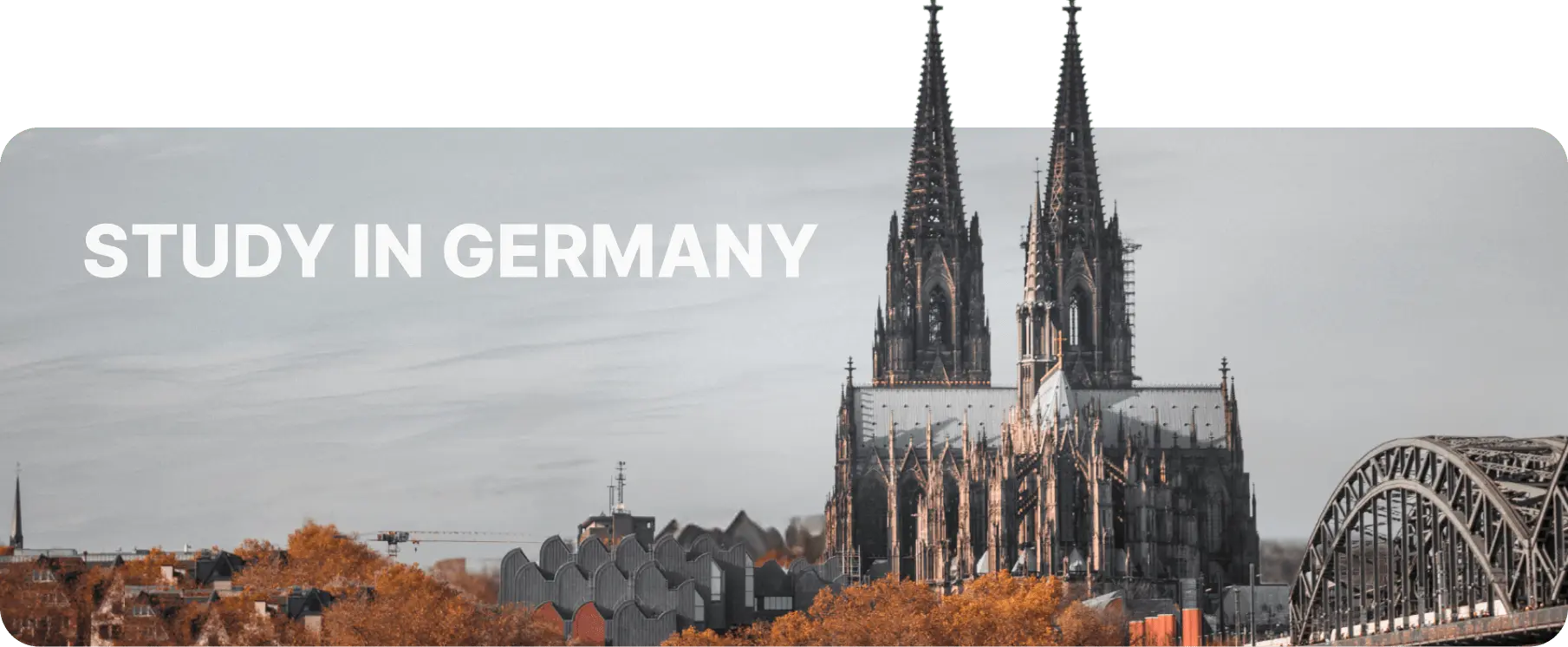

Germany is a top destination for ApplyBuds applicants, offering tuition-free education, cutting-edge research, and a strong academic reputation. With a thriving job market and rich cultural heritage, it’s an ideal choice for advancing careers.
Prestigious Institutions
6 universities in the world’s top 100, including LMU Munich University.
Diverse Programs
Over 2,000 English-taught courses across 300+ institutions.
Affordable Education
Free tuition at public universities; private fees from €5,000/year.
Global Career Opportunities
18-month post-graduation work visa with pathways to residency.
Welcoming Society
Safe, multicultural environment with a vibrant international community.
Innovative Learning Environment
Cutting-edge facilities and research-driven universities.
Germany is a top-tier study destination, celebrated for its world-class education system, affordability, and strong emphasis on innovation and research. As the birthplace of many renowned scientists and philosophers, Germany combines a deep academic heritage with modern advancements. International students are drawn to its low or no tuition fees, diverse study programs, and excellent post-graduation opportunities. With a vibrant multicultural environment and a high standard of living, studying in Germany provides a comprehensive educational and personal growth experience.
World-Class Education System
When you choose to study in Germany, you gain access to prestigious institutions like the Technical University of Munich, Heidelberg University, and RWTH Aachen. These universities are celebrated for their academic excellence and research-driven programs.
Rich Academic Heritage
Germany’s education system has a legacy of producing global icons like Albert Einstein and Max Planck. By opting to study in Germany, you join a lineage of innovators and intellectuals.
Affordable or Free Education
A key reason to study in Germany is its cost-effective education. Many public universities charge little to no tuition fees, making high-quality education accessible to students worldwide.
Diverse and Specialized Programs
Germany offers over 2,000 programs in English across disciplines like engineering, AI, renewable energy, and business. No matter your interests, there’s a program for you when you study in Germany.
Generous Scholarships and Funding
International students who study in Germany can take advantage of scholarships like DAAD, Deutschlandstipendium, and university-specific funding to ease financial burdens and focus on their studies.
High Visa Approval Rates
The streamlined visa process ensures that students planning to study in Germany can easily enter the country. Indian students, in particular, enjoy a supportive environment and form a significant community.
Travel Opportunities
Choosing to study in Germany also means exploring Europe. Located in the heart of the continent, Germany offers easy access to neighboring countries, allowing you to experience rich cultural diversity and unforgettable travel adventures.
Student life in Germany is vibrant and well-rounded, combining academic excellence with opportunities for personal growth and cultural immersion. Universities provide robust support systems to help international students adapt to academic and social life. Choosing to study in Germany offers a fulfilling and enriching experience.
Work-Study Balance
International students in Germany can work part-time for up to 20 hours per week during term time and full-time during holidays. Many students take up part-time roles to gain professional experience and support their living expenses, making it manageable to study in Germany.
Accommodation Options
Students in Germany can choose from university dormitories, private apartments, or shared accommodations. While university dorms are affordable and convenient, private options provide more independence. These flexible choices make living arrangements comfortable for those who study in Germany.
Cultural and Social Exposure
Germany’s universities host a multicultural student population, fostering a welcoming atmosphere for international students. Events like Oktoberfest, film screenings, and cultural nights allow students to engage deeply with local and global cultures. Studying in Germany is an excellent opportunity for cultural exploration and personal growth.
Student Blogs & Vlogs
Students who study in Germany often document their journeys through blogs and vlogs, sharing advice on adapting to German culture, managing finances, and navigating university systems. These real-world insights offer valuable guidance for incoming students, making the transition smoother.
Our Program Recommendation Engine helps you find the right-fit programs across hundreds of Germany universities and classifies them into Dream / Reach / Safe programs based on your profile data points. TRY THIS NOW – and find out program options in Germany that suit your education needs and budget.
The application process for German universities involves key steps, from preparing necessary documents to securing a student visa. Most universities charge an application fee ranging from €50 to €75, depending on the institution. Follow this guide to ensure your journey to study in Germany is smooth and successful.
Prepare for exams like TestAS or GMAT to boost your chances of admission.
A TestDaF or DSH certification is optional but adds value to your application.
Fill out the form with transcripts, test scores, and language proofs.
Show at least €11,904 in a blocked account for living expenses.
Apply for a visa with your admission letter and required documents.
APS Process for Germany
For students from countries like India, China, and Vietnam, the Academic Evaluation Centre (APS) is a key requirement. It verifies the authenticity of academic documents before you can apply to German universities.
Steps
Processing Time: The APS process may take 6-8 weeks depending on the volume of applications and the completeness of your documents.
Prepare a complete and competitive application by meeting the following academic and document standards.
Boost your admission chances by 90% with our Document Draft Creator - easily create standout SOP, LOR and Essay in just minutes!
Explore Germany's vibrant academic and cultural landscape through its top student cities. Each city is known for its prestigious universities, affordable living costs, and excellent career prospects for international students.
Germany’s capital blends history, innovation, and vibrant student life, with best universities in Berlin offering cutting-edge research and a cosmopolitan atmosphere.
Best universities in Munich blend old-world charm with cutting-edge technology and are home to major companies, offering a great start to your career.
Best Universities in Hamburg are part of this vibrant port city, known for its multicultural atmosphere, great student life, and top universities in areas like business, engineering, and media.
Germany's financial center, Frankfurt, offers excellent academic programs in business, finance, and economics, making it a great city for aspiring professionals looking to study at best universities in Frankfurt.
Best universities in Heidelberg, known for its historic university and beautiful surroundings, make it a top destination for students seeking a rich academic experience in a charming city.
Find the perfect program tailored to your goals. Discover detailed information on top universities, courses, fees, and more to kickstart your academic journey.
Tuition Fee
Germany is known for its affordability, with many public universities offering tuition-free education for international students. However, a small semester fee may apply to cover administrative costs and public transport. Here’s a breakdown of public and private university fees in Germany.
Public Universities
Tuition fees are free or minimal (€250 - €300 per semester), with a semester contribution of €100 - €350 depending on the university and region.
Private Universities
Tuition fees typically range from €20,000 to €35,000 per year, depending on the specific program, university reputation, and location within Germany.
Other Costs:
International students can choose from various housing arrangements, including:
Rent (on-campus or off-campus)
Utilities (electricity, water, gas, internet)
Food (groceries, dining out)
Travel (to and from your home country)
Other costs (books, transport, personal)
Other monthly expenses can include:
Take-out food
Travel and vacation
Car rental/insurance (if applicable)
Entertainment/TV
Other costs (books, transport, personal)
Germany offers a wide range of scholarships to ease financial burdens:
Merit-based scholarships reward academic excellence and outstanding achievements in specific fields of study. These scholarships are highly competitive and are aimed at top-performing students.
Need-based financial aid helps students who demonstrate financial need by covering tuition fees, living expenses, and other costs.
External scholarships are offered by organizations outside of universities, typically aiming to support specific groups of students or areas of study.
These are university-specific scholarships that are awarded to international students applying to study at Germany institutions.
These include various unique and specialized scholarships offered by Germany institutions.
What is the minimum IELTS score required for admission?
Generally, a minimum IELTS score of 6.5 is required.
Is the German language mandatory for part-time work or study permits?
While not mandatory, learning German significantly enhances part-time job prospects and helps with integration.
What are the benefits of studying in Germany?
Connect with a mentor to clarify all your doubts about studying in Germany; get your questions answered.
Explore flexible work opportunities and gain valuable industry experience while studying abroad in Germany. From part-time jobs to internships, discover options that complement your academics and enhance your career prospects.
On-Campus:
Off-Campus:
Internships
Our AI will curate a list of Dream, Reach, and Safe colleges to help you in the college selection process.
Navigating the German visa process is essential for international students. Here's a detailed guide to help you understand the requirements and application steps for securing your student visa in Germany.
Student Visa (Visum Zu Studienzwecken):
For students who have already secured admission into a German university for a full-time academic program. This is the most common visa for international students intending to pursue their degrees in Germany.
Cost - €75
Student Applicant Visa (Visum Zur Studienbewerbung)
For students who need to travel to Germany to complete admission requirements, attend entrance exams, or apply to universities in person. This visa is temporary and needs to be converted into a student visa once admission is confirmed.
Cost - €75
Language Course Visa
For students planning to attend a language course in Germany that is not directly tied to an academic degree program. This visa typically does not allow for transitioning into a full-time student visa later.
Cost - €75
Preparatory Course Visa
For students admitted to preparatory programs like Studienkolleg (for those whose qualifications do not directly meet German university requirements) or specific pre-degree programs.
Cost - €75
Researcher Visa
This visa is designed for postgraduate students or PhD candidates conducting advanced research or participating in structured doctoral programs in Germany. It allows extended stays and supports academic or scientific pursuits.
Cost - €75
Internship/Training Visa
This visa facilitates students coming to Germany for internships or practical training tied to their academic program. It’s ideal for gaining hands-on experience within a German organization or institution.
Cost - €75
Requirements
Below are the essential documents you will need to apply for a German student visa:
Visa Application Process for Germany
Here is a structured guide to applying for a Germany Student Visa, suitable for international students planning to study in Germany:
Visa Denials & Rejections
Common reasons for Germany student visa rejections include:
Let Us Help You Navigate the Process!
Get expert advice and support to ensure your visa application is successful.
Here are some quick facts about studying in Germany:
Germany hosts 48 universities ranked in the world’s top 500, including LMU Munich, Heidelberg University, and TU Munich.
Over 350,000 international students enroll annually, reflecting Germany's global appeal and high academic standards.
88% of international students recommend studying in Germany, and its degrees are globally recognized, leading to excellent career opportunities.
Most public universities in Germany offer tuition-free education, even for international students, making it a highly cost-effective study destination.
Germany is one of the safest countries globally, with a welcoming environment for international students from diverse backgrounds.
Germany is a global leader in research and innovation, providing abundant opportunities in engineering, technology, and the sciences.

Hear from students who have successfully achieved their academic goals with our guidance.
